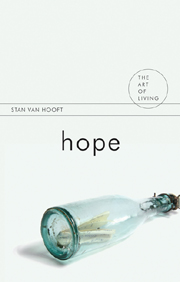4 - Hope and politics
Summary
Politics is the social and institutional attempt on the part of a community to formulate, agree on and implement policies for the common good. Whatever corruptions it might be subject to – and there are many – its primary focus is on good governance and the maintenance of cultural, social and economic conditions that will allow people to live full and happy lives in accordance with the values they and their communities hold dear. Whether the structures through which decisions are arrived at and put into effect are democratic or autocratic, participatory or hierarchical, liberal or authoritarian, the professed aim of political processes is the improvement of the lives of those who are encompassed by that political system. Given this focus on the future, on amelioration and on corruptible structures of power and control, it is not surprising that hope should be a central element in politics. To adapt Ricoeur's thesis about the goals of our innate hopefulness to the political sphere, people engage in politics because they hope for improvements in their lives, for cooperative relations with others, and for stable and just social structures in which to live.
Barack Obama
Perhaps the most resounding statement of this role of hope has come from US President Barack Obama. In the Democratic National Convention keynote address that he delivered on 27 July 2004, at the Fleet Center in Boston, then Illinois senator Obama endorsed John Kerry and John Edwards as Democratic Party candidates for the presidency and vice-presidency of the United States, respectively.
- Type
- Chapter
- Information
- Hope , pp. 81 - 101Publisher: Acumen PublishingPrint publication year: 2011



